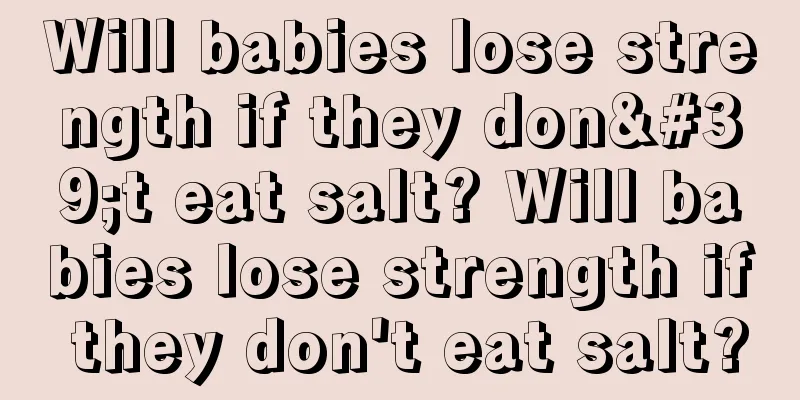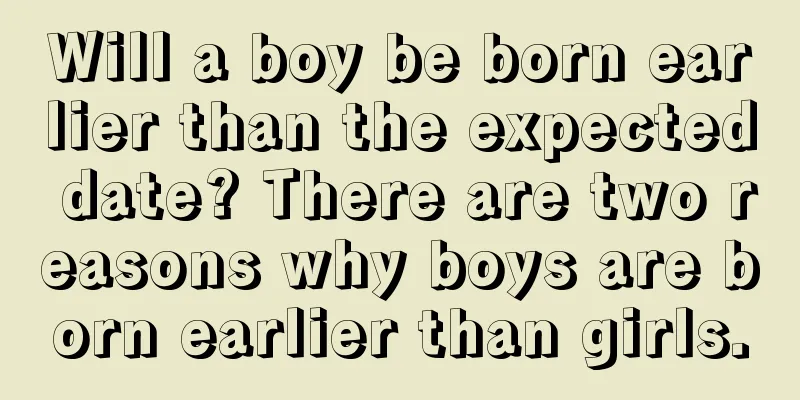Will babies lose strength if they don't eat salt? Will babies lose strength if they don't eat salt?

|
I believe many parents have heard the parenting ideas of the older generation, that babies will not grow fast and will not have energy if they do not add salt to their food. Is this true? Today, let's talk about whether the traditional Chinese parenting saying that babies will not have energy if they do not eat salt makes sense. How to choose rice flour as complementary food1How to mix rice flour and water There is no accurate mixing ratio for baby rice cereal and water. Parents can make the most appropriate ratio according to the different situations of each baby. When the baby eats rice cereal for the first time, since he has been drinking liquid milk before, parents can make the rice cereal thinner, and then slowly thicken it after the baby adapts. Scientific research shows that the most suitable water temperature for preparing rice cereal for babies is 70℃-80℃. Because too low water temperature will make rice cereal difficult to dissolve, it will form lumps of different sizes, making it difficult for babies to swallow, the taste will deteriorate, and it is not conducive to digestion; too high water temperature will lead to the loss of water-soluble nutrients in rice cereal, so parents who like to prepare rice cereal and then cook it should change the preparation method. 2. How to feed rice flour When a 4-month-old baby eats rice cereal for the first time, he or she may not be able to use a spoon. Parents can make the rice cereal thinner and feed it with a bottle. After the baby gets used to the taste of the rice cereal, use a special baby bowl and spoon to feed the baby. First put the rice cereal in a bowl, then add an appropriate amount of hot water according to the baby's needs, and stir in one direction until it becomes a paste. In addition to hot water, rice noodles can also be prepared with breast milk or formula milk water, or fruit juice. The method of preparation is to moisten the rice noodles with a small amount of hot water, then add breast milk or squeezed fruit juice, stir well and then eat. Baby eats too much saltZinc deficiency can cause high blood pressure High-salt foods can reduce oral saliva secretion and lysozyme, which allows various bacteria and viruses to exist in the upper respiratory tract. It can inhibit the reproduction of oral mucosal epithelial cells, causing them to lose their disease resistance. Due to the penetration of salt, it can kill the normal parasitic flora in the upper respiratory tract, causing flora imbalance and leading to illness. A high-salt diet will affect the absorption of zinc in children and lead to zinc deficiency. A high-salt diet will increase the burden on the baby's heart and kidneys. Babies are underdeveloped and cannot absorb too much salt. If too much salt is added to complementary foods, it will increase the burden on the baby's kidneys and heart, causing damage to organ function. If you develop a high-salt eating habit from a young age, it will be difficult to correct it when you grow up, and a high-salt eating habit can easily cause diseases such as high blood pressure. Infants aged 0 to 1 year According to the "Dietary Guidelines for Chinese Residents", infants under one year old do not need to eat additional salt. Babies have a more sensitive sense of taste than adults, so we cannot use adults’ taste to judge children’s taste. Babies can also enjoy food that adults find tasteless. Moreover, babies’ taste habits are still developing and they are more sensitive to the stimulation of seasonings. Adding salt can easily cause babies to reject tasteless original food. Children aged 1 to 3 years Children aged 1 to 3 years old need 700 mg of sodium (equivalent to 1.8 g of salt) every day, which is 350 mg more than infants aged 6 to 12 months. However, under normal circumstances, it is also possible to get enough sodium from food, such as milk, staple food, meat, green leafy vegetables, and fruits. Why babies don't need extra saltWhether it is breastfeeding, mixed feeding or bottle feeding, babies are generally not given extra salt (NaCl) before they start to eat complementary foods. But after adding complementary foods, many parents begin to wonder whether they should give their babies salt. Especially for children taken care of by the elderly, it is easy for them to eat complementary foods containing salt, including soups, at an early age. In fact, babies under 1 year old do not eat foods containing salt. Because milk and other complementary foods contain sodium needed by the human body, for babies who eat normally, they can fully meet the baby's physiological needs for sodium. On the contrary, it is well known that the high incidence of hypertension among adult residents in my country is related to high salt intake. If you want to control and reduce the salt intake in adulthood, you need to start from the baby. Do not eat salt in infancy, and try to eat a light diet in childhood. Only in this way can you better control the salt intake in adulthood. This requires that the baby's complementary food should maintain its original flavor. As long as the baby keeps eating original food during infancy, the baby can accept it. The saying that "no salt has no taste" is unfounded. In fact, do not add other seasonings to the baby's complementary food. The baby's taste buds are in the process of development and are more sensitive to the stimulation of seasonings. This is one of the reasons why many babies are not easy to accept original foods after eating foods containing salt and sugar. |
>>: How to eat baby rice cereal? The correct way to eat baby rice cereal
Recommend
What is the cause of baby's indigestion? How to treat children with long-term indigestion?
Many parents want their babies to eat more, think...
Are there any rewards for having a second child in 2017? Are there any rewards for having a second child in 2017?
The relaxation of the two-child policy has made m...
Can pregnancy oil really prevent stretch marks? Is olive oil effective in preventing stretch marks?
Usually most pregnant women are prone to stretch ...
Does Kao steam eye mask help you sleep? Is Kao steam eye mask good for your eyes?
The main purpose of wearing an eye mask is to hel...
What to do if your newborn baby always hums when sleeping
It is not easy for a newborn to sleep, and mother...
How should parents deal with injuries to their children?
Children are bound to bump into each other in kin...
What to do if your baby's mouth smells like rotten eggs? Bad breath problems cannot be ignored
Some babies have the smell of rotten eggs in thei...
The difference between Libai soap and laundry detergent. Which one is better?
Liby's laundry detergent products include not...
Does vitamin C deficiency in pregnant women have any effect on the fetus?
Pregnant mothers should have a balanced and reaso...
How to stimulate your baby's visual, auditory and tactile development
Babies are growing up every day. What parents car...
Is artificial insemination dangerous? What are the dangers of artificial insemination?
Although artificial insemination can help women g...
How to diagnose mumps in children? What are the complications of mumps in children?
Children generally have weaker immunity, and are ...
Do babies with diarrhea need zinc supplements? Do babies with diarrhea need to change milk powder?
Usually babies' stomachs are very fragile and...
What should I do if my baby is scratched by a cat? What should I do if my baby is bitten by a cat?
What should I do if my baby is scratched by a cat...
Does an electric blanket have radiation? Will an electric blanket cause a sore throat?
The main function of an electric blanket is to ma...









